One can only hope that the mighty and honourable Belgians will come to their senses and stop the Norwegian bid for world supremacy. 
The Great Game III : Trade and Dominion
- Thread starter King of Men
- Start date
-
We have updated our Community Code of Conduct. Please read through the new rules for the forum that are an integral part of Paradox Interactive’s User Agreement.
You are using an out of date browser. It may not display this or other websites correctly.
You should upgrade or use an alternative browser.
You should upgrade or use an alternative browser.
China did fight a war with the British, but I was a little distracted and didn't see the outcome. As for the Belgians, well, there's more to come. 
If I recall, he was offering me help against the English, yes. "Bah, are we not Ynglings?", I reply. Famous last words... The Burgundian DOW is three days away.
Weren't you listening, Abs? I'm pretty sure I wrote it down:

"...it is therefore my solemn duty to inform you that a state of war exists between the Kingdom of Burgundy, and the Yngling Realm."
The entry of Burgundy was a serious but not fatal blow. Denmark and the Baltic littoral could plainly not be held , and the OYH (Overkommando Ynglinga Hird, Supreme Command of the Yngling Hird) did not even try. As long as the navy could control the Kattegat and Skagerrak, the Scandinavian peninsula could be held as a mountain fortress. Meanwhile, the Canadian campaign could be fought to a conclusion with the vast array of troops that now became available, as the Ting at last felt forced to authorise full mobilisation; at the same time, the Burgundian colonies could be snapped up.
All this, however, relied on maintaining control of the seas, and a second disaster now struck. The shipyards of Britain had for three years, since the disaster to the invasion fleet, been building a large, modern navy. With many other claims on scarcer resources, Norway had been unable to keep pace; and in the vast Battle of the Skagerrak, the Norwegian ironclads were forced to retreat, and control not only of the Atlantic but even of the Baltic was lost. Suddenly unleashed, division upon division of Burgundian conscripts streamed into Skåne. At the same time British troops landed in strength in Finland. The entry of Poland into the war was mere icing on the cake of defeat; in the increasingly desperate memoranda and telegrams flying back and forth between OYH, the Ting, and the King, Poland seems hardly to have registered as a threat. Indeed, with the industrial heartland in Malmø and Stockholm threatened, the loss of Novgorod could reeasonably be dismissed as a minor problem.
This was the lowest ebb of Norway's fortunes; but now three years of hard fighting in Canada came to her aid. The British public was weary of a war which seemed to them not to touch on any vital British interest, and which had killed two hundred thousand of their sons. The Conservative government made the mistake of asking for a vote of confidence on its handling of the war, and lost by three votes after a thunderous speech by the Member for Newark. The resulting Liberal government offered Norway peace terms which, if not precisely generous, were at least survivable; and it was now no longer a question of the rule of Canada, or even of preserving Norwegian territory intact, but rather of the actual survival of Norway as a sovereign nation.
The situation after the peace with England:
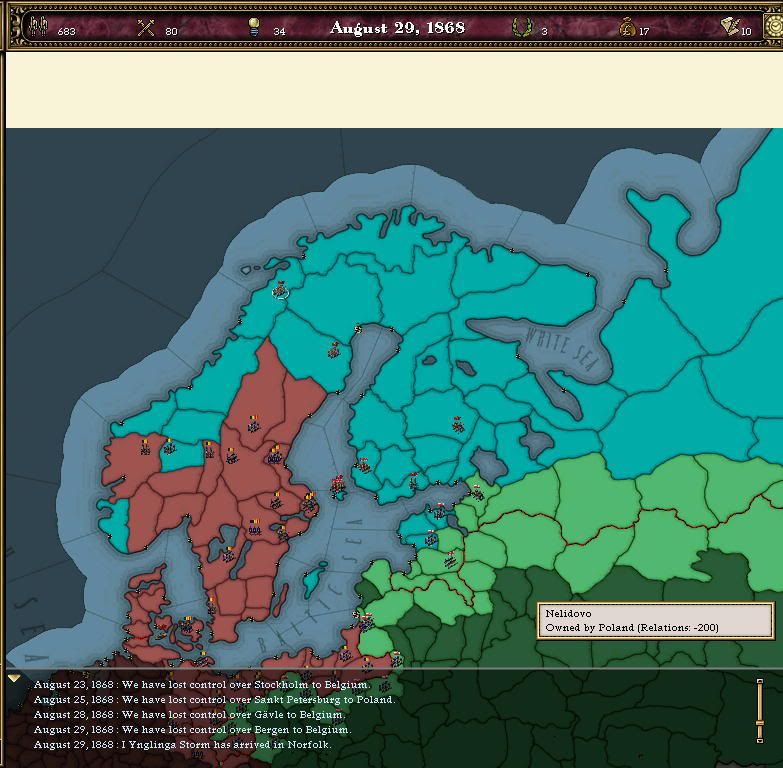
With the withdrawal of British troops, and more importantly ships, the situation eased enough that it became possible to fight on against the two remaining enemies. A defensive front was formed in Finland on the line Viipuri-Arkhangelsk; the awful terrain, coupled with the lessons learned in two years of trench warfare in the Americas, enabled the Yngling armies to hold off the Poles with almost contemptuous ease. Similarly, a thinly manned defensive line from Narvik to Luleå finally stopped the Belgian advance, with considerable help from the mountains.
A lopsided battle for Umeå, with twenty Burgundian divisions being held off by five of mine. A lot of German and Dutch boys leaving their bones in those mountains. This is where I really broke the back of the invasion.
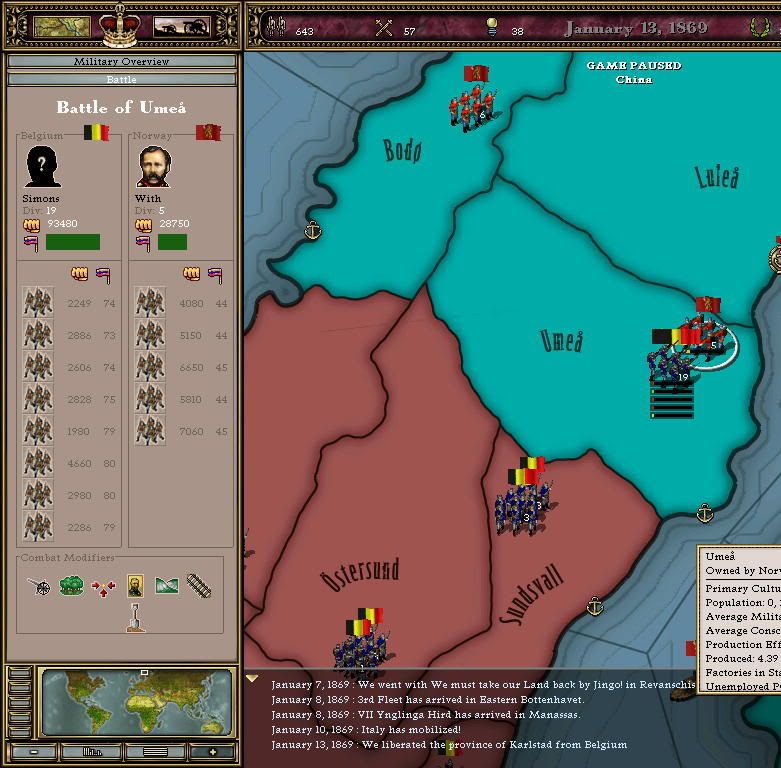
Finland was thus preserved as a final bastion. Further, the Navy was now again able to assert its control of the sea lanes, and supplies and reinforcements for the occupying Belgian troops were thereby cut off; while the vast, thinly settled area of Scandinavia was a perfect theater for guerrillas. With the return of the regular army from Canada, Bergen and the southern part of Norway was retaken; but the Burgundians proved able to learn from the tactics of their opponents, and Yngling troops had no more luck attacking fortified positions in the mountains than their foes. The war thus settled into something of a stalemate, with most of Sweden and a large part of Norway occupied; but Norway now retained the crucial freedom of the seas.
Situation after my counterattacks, with Finland and southern Norway as bastions, and a new assault beginning in Denmark:
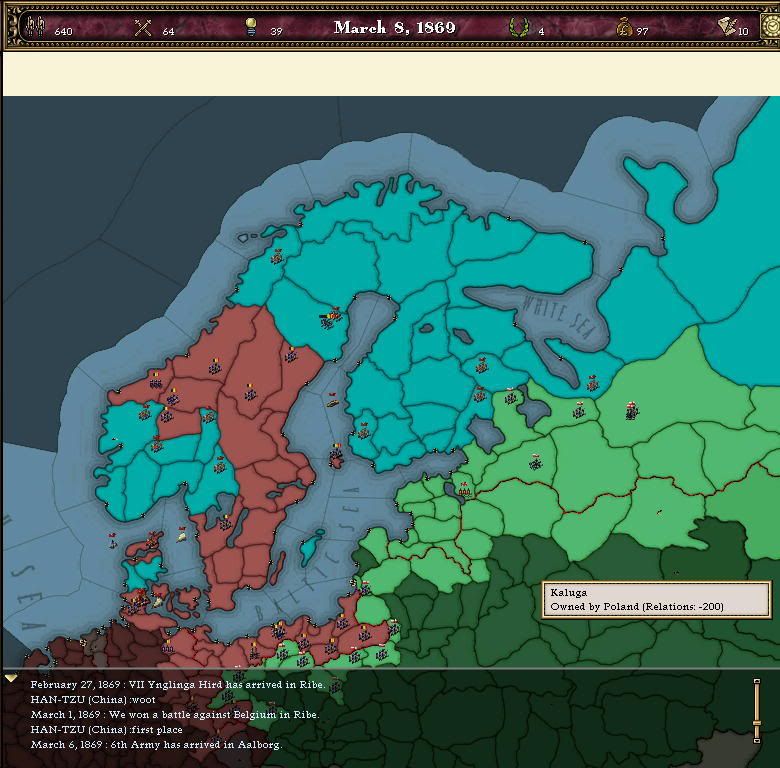
This freedom was immediately put to good use. New divisions were raised by every expedient thinkable, and some that would have been unthinkable before the war. Yngling women were not merely permitted to serve, but actually conscripted for fighting units; strils were armed in ever-increasing numbers (this measure squeaked past the Ting by a single vote; a much higher majority had voted for the formation of 'Valkyrie' units of women); the rationing system for strils was applied to Ynglings in order to free up supplies for the fighting front; boys of 16, still completing their training, were given rifles and sent off to fight alongside men of fifty recalled to the colours. With the actual homeland invaded, even the strils proved patriotic, and Yngling propaganda underwent a sudden shift in the direction of every Norwegian being in it together. Since this was accompanied by genuine and visible sacrifice on the part of the Ynglings, the strils appear to have felt that this was fair enough, and most fought loyally and effectively against the invader. In any case, the old barriers were perforce broken apart by the pressure of war; Yngling and stril units were thrown together by the ebb and flow of attack and counterattack, and soon nobody questioned whether a a fighting man had the right to be in the Hird, as long as he handled his rifle well. Among the fighting troops, a sort of rough egalitarianism broke out, which was to have far-reaching consequences after the war.
With the main Burgundian armies trapped (or operating, depending on one's point of view) in Scandinavia, an amphibious assault across the Kattegat was an obvious counterstroke. The OYH intended to halt the advance at the prewar border, thus freeing up the industries and fighting strength of Denmark; but in fact the landings were so successful that the defensive line was extended far down into northern Germany, even reaching the Polish border. There it halted as the Burgundians in their turn stamped new armies out of the earth.
The German front. I'm stuck right here, I can no more break through dug-in bonuses of 60 than the Burgundians can. However, I still have some tricks up my sleeve; stay tuned next week!
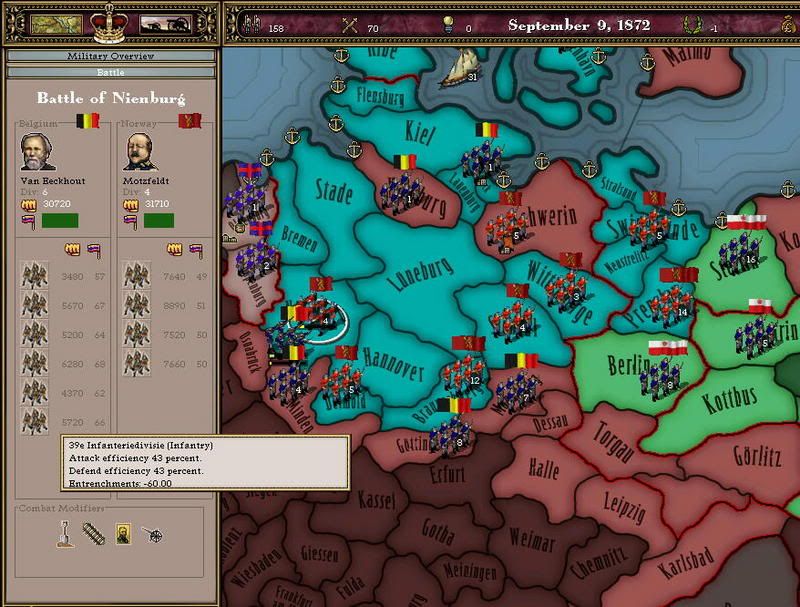
All this, however, relied on maintaining control of the seas, and a second disaster now struck. The shipyards of Britain had for three years, since the disaster to the invasion fleet, been building a large, modern navy. With many other claims on scarcer resources, Norway had been unable to keep pace; and in the vast Battle of the Skagerrak, the Norwegian ironclads were forced to retreat, and control not only of the Atlantic but even of the Baltic was lost. Suddenly unleashed, division upon division of Burgundian conscripts streamed into Skåne. At the same time British troops landed in strength in Finland. The entry of Poland into the war was mere icing on the cake of defeat; in the increasingly desperate memoranda and telegrams flying back and forth between OYH, the Ting, and the King, Poland seems hardly to have registered as a threat. Indeed, with the industrial heartland in Malmø and Stockholm threatened, the loss of Novgorod could reeasonably be dismissed as a minor problem.
This was the lowest ebb of Norway's fortunes; but now three years of hard fighting in Canada came to her aid. The British public was weary of a war which seemed to them not to touch on any vital British interest, and which had killed two hundred thousand of their sons. The Conservative government made the mistake of asking for a vote of confidence on its handling of the war, and lost by three votes after a thunderous speech by the Member for Newark. The resulting Liberal government offered Norway peace terms which, if not precisely generous, were at least survivable; and it was now no longer a question of the rule of Canada, or even of preserving Norwegian territory intact, but rather of the actual survival of Norway as a sovereign nation.
Norway accepted peace with United Kingdom on the following terms : Davenport to United Kingdom, Milwaukee to United Kingdom, Green Bay to United Kingdom, Minnesela to United Kingdom, Helena to United Kingdom, Bismarck to United Kingdom, Billings to United Kingdom, Aberdeen to United Kingdom, Minneapolis to United Kingdom, Lansing to United Kingdom, Duluth to United Kingdom, Great Falls to United Kingdom, Missoula to United Kingdom, Minot to United Kingdom, Roseau to United Kingdom, Nelson to United Kingdom, Marquette to United Kingdom & Grand Forks to United Kingdom.
The situation after the peace with England:

With the withdrawal of British troops, and more importantly ships, the situation eased enough that it became possible to fight on against the two remaining enemies. A defensive front was formed in Finland on the line Viipuri-Arkhangelsk; the awful terrain, coupled with the lessons learned in two years of trench warfare in the Americas, enabled the Yngling armies to hold off the Poles with almost contemptuous ease. Similarly, a thinly manned defensive line from Narvik to Luleå finally stopped the Belgian advance, with considerable help from the mountains.
A lopsided battle for Umeå, with twenty Burgundian divisions being held off by five of mine. A lot of German and Dutch boys leaving their bones in those mountains. This is where I really broke the back of the invasion.

Finland was thus preserved as a final bastion. Further, the Navy was now again able to assert its control of the sea lanes, and supplies and reinforcements for the occupying Belgian troops were thereby cut off; while the vast, thinly settled area of Scandinavia was a perfect theater for guerrillas. With the return of the regular army from Canada, Bergen and the southern part of Norway was retaken; but the Burgundians proved able to learn from the tactics of their opponents, and Yngling troops had no more luck attacking fortified positions in the mountains than their foes. The war thus settled into something of a stalemate, with most of Sweden and a large part of Norway occupied; but Norway now retained the crucial freedom of the seas.
Situation after my counterattacks, with Finland and southern Norway as bastions, and a new assault beginning in Denmark:

This freedom was immediately put to good use. New divisions were raised by every expedient thinkable, and some that would have been unthinkable before the war. Yngling women were not merely permitted to serve, but actually conscripted for fighting units; strils were armed in ever-increasing numbers (this measure squeaked past the Ting by a single vote; a much higher majority had voted for the formation of 'Valkyrie' units of women); the rationing system for strils was applied to Ynglings in order to free up supplies for the fighting front; boys of 16, still completing their training, were given rifles and sent off to fight alongside men of fifty recalled to the colours. With the actual homeland invaded, even the strils proved patriotic, and Yngling propaganda underwent a sudden shift in the direction of every Norwegian being in it together. Since this was accompanied by genuine and visible sacrifice on the part of the Ynglings, the strils appear to have felt that this was fair enough, and most fought loyally and effectively against the invader. In any case, the old barriers were perforce broken apart by the pressure of war; Yngling and stril units were thrown together by the ebb and flow of attack and counterattack, and soon nobody questioned whether a a fighting man had the right to be in the Hird, as long as he handled his rifle well. Among the fighting troops, a sort of rough egalitarianism broke out, which was to have far-reaching consequences after the war.
With the main Burgundian armies trapped (or operating, depending on one's point of view) in Scandinavia, an amphibious assault across the Kattegat was an obvious counterstroke. The OYH intended to halt the advance at the prewar border, thus freeing up the industries and fighting strength of Denmark; but in fact the landings were so successful that the defensive line was extended far down into northern Germany, even reaching the Polish border. There it halted as the Burgundians in their turn stamped new armies out of the earth.
From Berserker to Battleship : Norway 1066-1920, Bergenhus University Press.
The German front. I'm stuck right here, I can no more break through dug-in bonuses of 60 than the Burgundians can. However, I still have some tricks up my sleeve; stay tuned next week!

Wow! That was quite the session! Very impressive counterattack by the Ynglings. I'm eager to see how this ends.
One thought - you appear to have the military aspect of the game covered in your AARs, but what's the situation on the homefront? I.e., political parties, polls, etc.? If I've managed to miss the section in which you detailed this, however, just smack me upside the head...I tend to be a speed-reader when it comes to AARs.
Btw, does your group still play on Saturdays? It's beginning to look like my group may have to skip tomorrow's session due to player absences. If that's the case, I would be available to sub if your group needs one tomorrow from 1000 CST on (I believe that is 1500 GMT, although I could be wrong). Just shoot me a PM if you need one and I should be able to give you a firm answer before tomorrow. Thanks!
One thought - you appear to have the military aspect of the game covered in your AARs, but what's the situation on the homefront? I.e., political parties, polls, etc.? If I've managed to miss the section in which you detailed this, however, just smack me upside the head...I tend to be a speed-reader when it comes to AARs.
Btw, does your group still play on Saturdays? It's beginning to look like my group may have to skip tomorrow's session due to player absences. If that's the case, I would be available to sub if your group needs one tomorrow from 1000 CST on (I believe that is 1500 GMT, although I could be wrong). Just shoot me a PM if you need one and I should be able to give you a firm answer before tomorrow. Thanks!
Well, I'm not that impressed with Vicky's modelling of that kind of thing, especially where it doesn't fit my backstory, so I tend to wing it as I go along. Once this war is over I intend to have a nice section on the social effects, including a detailed look at the legal status of the strils.
Sent you a PM about subbing.
Sent you a PM about subbing.
Incidentally, you might find it interesting to take a look at the manpower situation in those screenies from 1869 and 1872. I go from 683 to 158. Each point of manpower being a thousand men, and taking into account that I have a fairly fast replenishment rate, that's something like three-quarters of a million casualties in three years. That's rather more than Northern losses in the American Civil war, and over a shorter period - though my population is rather larger, it's true. On the other hand a lot of it is Germans and Russians, not to mention Africans and Cambodians, whom I am certainly not handing any weapons to, thanks kindly. We are talking about a demographic catastrophe of really epic proportions, here.
Go Belgium go! Kill those Ynglings! 
Anyways, quite an impressive counterattack there KoM, nice work.
Anyways, quite an impressive counterattack there KoM, nice work.
A trully great war, a shame about the Brits though...
Also, while egalitarianism is nice and all that for the wartime, I couldn't but feel that AFTER the war it will come back to haunt you. Ynglings will try to roll things back, strils will hunger for more...
Also, while egalitarianism is nice and all that for the wartime, I couldn't but feel that AFTER the war it will come back to haunt you. Ynglings will try to roll things back, strils will hunger for more...
King of Men said:Well, I'm not that impressed with Vicky's modelling of that kind of thing, especially where it doesn't fit my backstory, so I tend to wing it as I go along. Once this war is over I intend to have a nice section on the social effects, including a detailed look at the legal status of the strils.
That's probably because your backstory sort of defines unrealism?
Defines unrealism? Hmmf. It's certainly more realistic than a plague very conveniently killing off all the nobility of the nation, leaving nobody to resist foreign colonisation! I mean, come on, how likely is that?
As for problems after the war, let's bomb that bridge when we come to it, eh? Right now the Ynglings kind of have their hands full.
As for problems after the war, let's bomb that bridge when we come to it, eh? Right now the Ynglings kind of have their hands full.
Dawn, March 18th, 1873
Outside Viipuri, on the Finnish front
The Poles had been bringing up reinforcements for the past month, wild tribesmen off their Siberian steppes. Matti had seen them for himself two days before, when the Ynglings had brought in prisoners; little yellow-brown men with savage eyes, recruited with a promise of vodka and loot. Not that I'm so different myself, he admitted; it was thin rations in Viipuri these days, if you weren't in the fighting services, and had been for as long as he could remember. The Army got potatoes every day, and meat sometimes - "whenever the Poles attack", as the bitter jest went. It had been a long time since the front moved in Finland.
The rumour mill had it that there would be another attack soon, which was why Erik was out here in the chill, reinforcing the usual watch. He had asked one of the Ynglings about it the night before, after the prisoners had been - his mind shied from the word; it was better not to think too closely about what happened to prisoners. The Yngling had laughed, and told him that if he was so eager to use his rifle, he'd certainly get a chance. Then he'd grown serious, with that instant deadening of the face that was the hallmark of a veteran of this war, and nodded in the direction of the Polish trenches. "Hear that howling, lad?" he had said. "That's what happens when you give good vodka to Mongols. They'll be over here tomorrow, depend on it."
At that moment, Matti was shaken out of his reverie by more howling from the Polish lines. He looked up quickly over the edge of his trench. Two hundred yards from where he stood, men were boiling out of the ground, throwing themselves into a death-or-glory dash across the beaten zone between the trenches. They screamed as they ran, an ululating, high-pitched howl that woke ancient instinct in anyone who heard it : Enemy tribe, raid, come out to fight!
There was no need to raise the alarm, the Poles had done that quite effectively; Matti sprang instead to a firing-step and brought his rifle to bear. There was no need to aim at such a mass of men, just fire away, reload, fire again. Meanwhile, around him his comrades were coming out of their dugout to take up their own firing positions; to his right a machine gun began to bang away, then others took it up, and the huge whizz-bang of 78-millimeter shells began to blow great holes in the onrushing host. The shoulder-to-shoulder rush of the attackers made them a perfect target; within half a minute Matti found that he had to take aim, then that he had to search for targets, then that there was nothing to shoot at except the wounded writhing on the ground. He refrained, not from any sense of mercy but because he knew well the Yngling view on strils who wasted ammunition.
Someone clapped him on the back, staggering him slightly; it was the Yngling he'd spoken to the night before. "All right, lad, not bad. Not everyone can shoot their first time, and then stop shooting when it's over. You'll do." Matti stared in awe at the unprecedented spectacle of an Yngling being friendly, then found the wits to smile weakly. Not quite knowing how to handle the situation, he turned to look down the slope at the remnants of the broken attack; for a hundred yards or more the ground was littered with shattered bodies, but none had come within ten meters of his own trench. Perhaps sensing his discomfort, the Yngling did the same, and nothing was said for a minute or so. At last Matti decided that the Yngling really was trying to be friendly, and he'd better make an effort himself.
"Why do they do this?", he asked, gesturing at where the wounded were crawling back to the Polish lines. "It can't be doing them much good." The snap-snap-snap of the designated snipers doing their best to finish off the wounded underscored his words.
"I don't think they've quite grasped what a machine gun really does, yet. Or maybe they just don't care what happens to Mongols? Every man we have to keep here is one who can't fight in Germany. If they never attacked us we'd thin out the lines and attack them somewhere else."
There was silence for another minute or so, except for the crackling of the snipers and the moaning cries of the Polish wounded. Then the Yngling shook himself - an impressive sight to a war-starved boy like Matti; he felt sure the man could crush his head in one massive hand - and sighed. "Well, that's nothing for us to worry about. We go where we're told and shoot Poles when they attack, eh? And it looks like we'll have meat tonight. It's not a bad war, when you think about it."
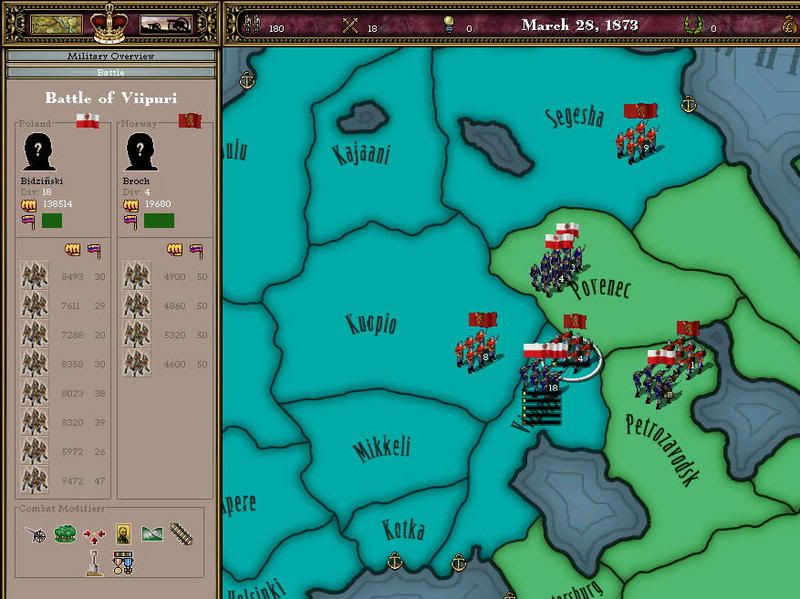
The Finnish front. Tell you the truth, I'm damned if I know what my troops are eating; it's not as though Norway can feed itself, in fact we haven't since well before Nappy. But they're certainly keeping the Poles at bay, though you'll notice that they have actually managed to move the front from the line Viipuri-Povenec-Arkhangelsk to Viipuri-Kuopio-Segesha. Not much to show for five years of bitter fighting.
Outside Viipuri, on the Finnish front
The Poles had been bringing up reinforcements for the past month, wild tribesmen off their Siberian steppes. Matti had seen them for himself two days before, when the Ynglings had brought in prisoners; little yellow-brown men with savage eyes, recruited with a promise of vodka and loot. Not that I'm so different myself, he admitted; it was thin rations in Viipuri these days, if you weren't in the fighting services, and had been for as long as he could remember. The Army got potatoes every day, and meat sometimes - "whenever the Poles attack", as the bitter jest went. It had been a long time since the front moved in Finland.
The rumour mill had it that there would be another attack soon, which was why Erik was out here in the chill, reinforcing the usual watch. He had asked one of the Ynglings about it the night before, after the prisoners had been - his mind shied from the word; it was better not to think too closely about what happened to prisoners. The Yngling had laughed, and told him that if he was so eager to use his rifle, he'd certainly get a chance. Then he'd grown serious, with that instant deadening of the face that was the hallmark of a veteran of this war, and nodded in the direction of the Polish trenches. "Hear that howling, lad?" he had said. "That's what happens when you give good vodka to Mongols. They'll be over here tomorrow, depend on it."
At that moment, Matti was shaken out of his reverie by more howling from the Polish lines. He looked up quickly over the edge of his trench. Two hundred yards from where he stood, men were boiling out of the ground, throwing themselves into a death-or-glory dash across the beaten zone between the trenches. They screamed as they ran, an ululating, high-pitched howl that woke ancient instinct in anyone who heard it : Enemy tribe, raid, come out to fight!
There was no need to raise the alarm, the Poles had done that quite effectively; Matti sprang instead to a firing-step and brought his rifle to bear. There was no need to aim at such a mass of men, just fire away, reload, fire again. Meanwhile, around him his comrades were coming out of their dugout to take up their own firing positions; to his right a machine gun began to bang away, then others took it up, and the huge whizz-bang of 78-millimeter shells began to blow great holes in the onrushing host. The shoulder-to-shoulder rush of the attackers made them a perfect target; within half a minute Matti found that he had to take aim, then that he had to search for targets, then that there was nothing to shoot at except the wounded writhing on the ground. He refrained, not from any sense of mercy but because he knew well the Yngling view on strils who wasted ammunition.
Someone clapped him on the back, staggering him slightly; it was the Yngling he'd spoken to the night before. "All right, lad, not bad. Not everyone can shoot their first time, and then stop shooting when it's over. You'll do." Matti stared in awe at the unprecedented spectacle of an Yngling being friendly, then found the wits to smile weakly. Not quite knowing how to handle the situation, he turned to look down the slope at the remnants of the broken attack; for a hundred yards or more the ground was littered with shattered bodies, but none had come within ten meters of his own trench. Perhaps sensing his discomfort, the Yngling did the same, and nothing was said for a minute or so. At last Matti decided that the Yngling really was trying to be friendly, and he'd better make an effort himself.
"Why do they do this?", he asked, gesturing at where the wounded were crawling back to the Polish lines. "It can't be doing them much good." The snap-snap-snap of the designated snipers doing their best to finish off the wounded underscored his words.
"I don't think they've quite grasped what a machine gun really does, yet. Or maybe they just don't care what happens to Mongols? Every man we have to keep here is one who can't fight in Germany. If they never attacked us we'd thin out the lines and attack them somewhere else."
There was silence for another minute or so, except for the crackling of the snipers and the moaning cries of the Polish wounded. Then the Yngling shook himself - an impressive sight to a war-starved boy like Matti; he felt sure the man could crush his head in one massive hand - and sighed. "Well, that's nothing for us to worry about. We go where we're told and shoot Poles when they attack, eh? And it looks like we'll have meat tonight. It's not a bad war, when you think about it."

The Finnish front. Tell you the truth, I'm damned if I know what my troops are eating; it's not as though Norway can feed itself, in fact we haven't since well before Nappy. But they're certainly keeping the Poles at bay, though you'll notice that they have actually managed to move the front from the line Viipuri-Povenec-Arkhangelsk to Viipuri-Kuopio-Segesha. Not much to show for five years of bitter fighting.
What is your total Pop, KoM? I'm afraid these long wars will bleed Norway dry and leave you prostrate for years afterwards.
Tell you the truth, I'm damned if I know what my troops are eating
Introduce mandatory cannibalism! Okay, its not a very Viking to do, but neither are crucifixions, and one can always put a positive spin on it, something about self-sacrifce and so forth.
Population is somewhere around 110 million, total; about one-fifth of that is Norwegians, maybe another ten percent are Finns, Swedes, and Danes, and the rest are assorted colonial populations - counting Northern Germany as a colony. I estimate that after this session my total casualties are around 2 million, and as for economic development, just forget about it. It may not quite come to mandatory cannibalism, but more-or-less voluntary euthanasia for useless mouths can't be far off.

